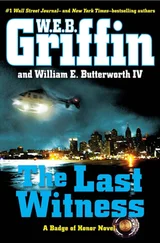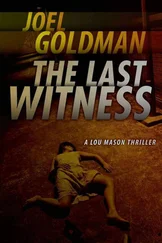John Matthews - The Last Witness
Здесь есть возможность читать онлайн «John Matthews - The Last Witness» весь текст электронной книги совершенно бесплатно (целиком полную версию без сокращений). В некоторых случаях можно слушать аудио, скачать через торрент в формате fb2 и присутствует краткое содержание. Жанр: Триллер, на английском языке. Описание произведения, (предисловие) а так же отзывы посетителей доступны на портале библиотеки ЛибКат.
- Название:The Last Witness
- Автор:
- Жанр:
- Год:неизвестен
- ISBN:нет данных
- Рейтинг книги:5 / 5. Голосов: 1
-
Избранное:Добавить в избранное
- Отзывы:
-
Ваша оценка:
- 100
- 1
- 2
- 3
- 4
- 5
The Last Witness: краткое содержание, описание и аннотация
Предлагаем к чтению аннотацию, описание, краткое содержание или предисловие (зависит от того, что написал сам автор книги «The Last Witness»). Если вы не нашли необходимую информацию о книге — напишите в комментариях, мы постараемся отыскать её.
The Last Witness — читать онлайн бесплатно полную книгу (весь текст) целиком
Ниже представлен текст книги, разбитый по страницам. Система сохранения места последней прочитанной страницы, позволяет с удобством читать онлайн бесплатно книгу «The Last Witness», без необходимости каждый раз заново искать на чём Вы остановились. Поставьте закладку, и сможете в любой момент перейти на страницу, на которой закончили чтение.
Интервал:
Закладка:
They’d all be there, Michel reflected: slim, dapper Jean-Paul, his mid-brown hair greying heavily in sweeps at each side, but still looking younger than his fifty-one years. His mother Lillian, 74, who now spent more time at the family’s holiday residence in Martinique than in Montreal. Deeply religious, her permanent tan, designer clothes and henna-tinted grey hair at times seemed vain, superficial affectations at odds with her firm-rooted nature, with all revolving around the church and family; but she looked well, and her age showed only with her slightly matronly bulk and resultantly slowed gait. Simone’s younger brother Raphael, 15, now in 6 thGrade at Montreal’s top Catholic school, St Francis, where he shone at art and literature; but to his father’s concern he was poor at math, showed little future promise for business, and spent his every spare moment rollerblading or, in the winter, snow-boarding. They looked like any other new-moneyed Montreal family, probably more upper-middle than top drawer — until you got to the photos of Roman and the Lacaille family’s key enforcer, Frank Massenat, so often in Roman’s shadow. Then the underlying menace of the Lacaille family became evident.
Roman was four years younger than Jean-Paul and, while only two inches smaller at five-eight, looked shorter still due to his broadness and bulk. While Jean-Paul had been on the tennis court or jogging, Roman had been in the gym pumping iron or pummelling a punch-bag until he was ready to drop. He was known as ‘The Bull’, not just through his build, but because of his habit of keeping his head low and looking up at people, swaying it slightly as he weighed their words; a motion that would become more pronounced if he started to doubt or didn’t like what they were saying. He reminded people of a bull measuring a matador for attack — and there had been many horror stories of Roman striking out swiftly and unpredictably, head first, ending any potential argument or fight by caving in his opponent’s face.
Head and shoulders above Roman, Frank Massenat was a giant. Seven years ago, when he first joined the Lacailles, he was at the peak of physical condition, but a diet of salami and pastrami rolls, beer and rich cream-sauce meals had steadily mounted on the pounds, so that now he looked like a big lumbering bear with a beer pot. With his eyes heavily-bagged and jowls, he looked almost ten years older than his thirty-four years.
In contrast, Jon Larsen, the family’s Consiglieri and adviser for almost twenty years, would fit in well in a family wedding snap. Close to sixty, slim, now mostly bald with only a ring of grey hair, he could easily have passed for a family uncle or perhaps Jean-Paul’s older brother.
Michel’s gaze swung back to the photos of Jean-Paul. In the end, Jean-Paul always absorbed him most — not only because as the head of the organization that’s where his main focus should be — but because he never could quite work him out. At least with Roman and Frank, what you saw, you got.
Michel was a keen modern jazz fan, and he remembered once being surprised at seeing Jean-Paul Lacaille at the city’s main jazz club, ‘Biddle’s’ on Rue Aylmer. He later learnt that, indeed, Jean-Paul was a strong jazz aficionado, particularly of the new Latin jazz. Michel found it hard to separate in his mind this urbane, charming persona, now also presumably with good music tastes, from what he knew to be the cold-hearted, brutal reality. That here was a man who as easily as he smiled and nodded along with his guests in the jazz club, could with the same curt nod signal that a man be brutalised or his life taken. The two just didn’t sit comfortably together — though charming, smiling, socialite Jean-Paul was the image being pushed more and more these past few years, trying to convince everyone that he’d turned his back on crime and had become ‘legit’. Michel didn’t believe it for a minute.
Three photos Michel had purposely pinned to one side of the main spread. The three main losses of the Lacaille family: Pascal, Jean-Paul and Roman’s younger brother, shot dead five years ago at the age of thirty-eight, the tragic end result of a battle with the rival Cacchione family. Their father, Jean-Pierre, dead fourteen months later, many said of a broken rather than failed heart — Pascal had been his favourite. Then just three years ago, Jean-Paul’s second wife Stephanie after a long battle with breast cancer. The Lacailles had seen their fair share of tragedy these past years, reflected Michel; but even that Jean-Paul had sought to turn to advantage. He’d held up Pascal’s death like a banner as the main reason behind his decision to move the family away from crime. Jean-Paul was a consummate audience player, would have made a good politician.
Michel rubbed his eyes. ‘When do you hope to hear from Arnaiz?’
‘Within a few hours. Certainly before lunch.’ Chac forced a tight smile. ‘Hopefully he might have something interesting this time.’
Michel nodded, but he doubted it. Chac was just trying to lift his spirits after the calamity with Savard. On the last five trips by Donatiens to Mexico — the trips to Cuba they hadn’t monitored — Enrique Arnaiz had turned up nothing. Arnaiz was a private investigator Chac had dug up from his old card file. The Federalis wouldn’t get involved unless or until Donatiens was seen with known drug associates or other criminals — so each time Arnaiz would have Donatiens followed and those he met with photographed for comparison with Federali files. Michel wasn’t hopeful of anything turning up this time either.
That was the other conundrum. Was Donatiens a clean-cut money-man only dealing with the Lacaille’s legitimate enterprises, or one of the sharpest and most efficient money-launderers they’d ever encountered?
‘What do you think, Chac? Is Donatiens what Jean-Paul keeps selling him as, the golden boy making good on his shiny new leaf as a legitimate businessman — or are his hands dirty along with the rest of them?’
Though the question had been posed before, with Savard gone Chac knew that it was now far more significant. He weighed his answer carefully. ‘On the surface at least he looks clean, however much that goes against the grain with the Lacaille’s past form. But from our point of view, I suppose it’s best if he is clean. If he’s in with the rest of them all the way, we’ll never get him to testify.’
‘That’s true.’ Michel voice was flat, nonchalant. He took a fresh breath. ‘Now all we’ve got to do is get him to turn his back on the love of his life and betray her entire family.’
‘Yeah, that’s all,’ Chac agreed drolly. Then, after a few seconds uneasy silence: ‘One thing we never did work out was what Donatiens was doing in the car the night Leduc was shot. The only time it looked like he might be getting his hands dirty.’
‘No, that we never did.’ Michel stayed staring contemplatively at the spread of photos ahead, as if they might magically provide the answer, and after a moment Chac left him alone with the Lacaille family and his thoughts.
He worked quickly and efficiently through the penthouse.
He found a ventilation grill in the main en-suite bathroom to take one bug, the hollow base of a table lamp in the dining room, another. Then he paused, hard pushed for good places for the others: a lot of flat, smooth surfaces, minimalist furniture and decor.
In the end he cut a tiny hole in the fabric beneath the main sofa and tucked a bug far to one side with one finger, did the same under the beds in all three bedrooms, then removed and clipped back a kitchen cabinet plinth to conceal the final room bug. The phone bugs, one in the drawing room and one in the bedroom, he put in place last.
Carlo Funicelli stood for a moment in the middle of the apartment, looking from one extremity to the other, contemplating whether he’d left any dead sound areas. The guest bathroom and maybe the first yard of entrance corridor. Hopefully not too many vital, meaningful conversations would take place there.
Читать дальшеИнтервал:
Закладка:
Похожие книги на «The Last Witness»
Представляем Вашему вниманию похожие книги на «The Last Witness» списком для выбора. Мы отобрали схожую по названию и смыслу литературу в надежде предоставить читателям больше вариантов отыскать новые, интересные, ещё непрочитанные произведения.
Обсуждение, отзывы о книге «The Last Witness» и просто собственные мнения читателей. Оставьте ваши комментарии, напишите, что Вы думаете о произведении, его смысле или главных героях. Укажите что конкретно понравилось, а что нет, и почему Вы так считаете.












